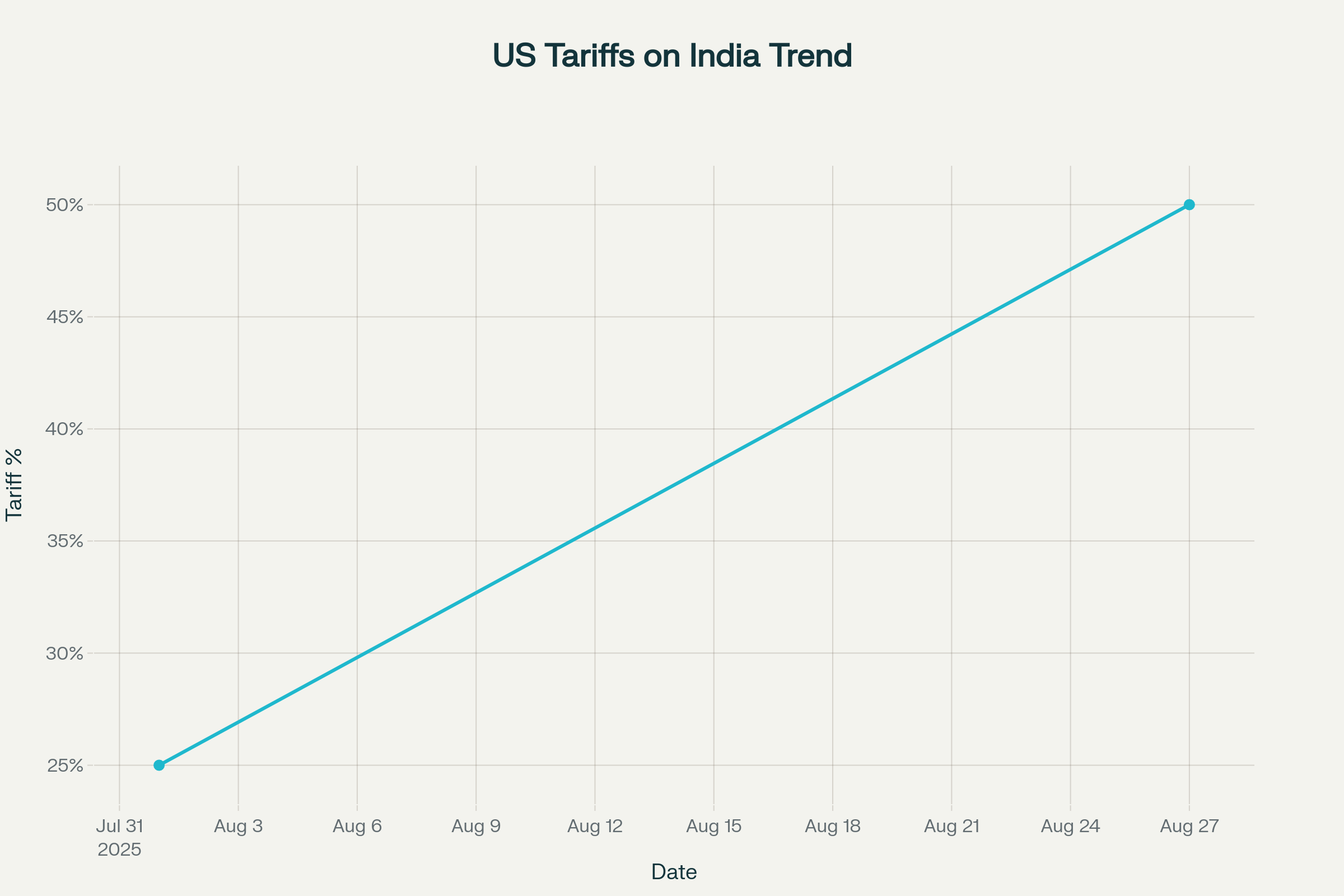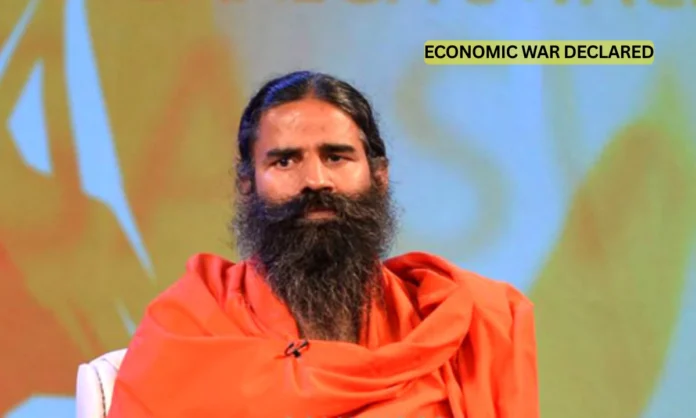Key Highlights:
- Baba Ramdev boycott call targets American brands including Pepsi, McDonald’s, KFC, and Coca-Cola following unprecedented 50% US tariffs on Indian exports
- The Baba Ramdev Boycott Call aims to create “chaos in America” through mass consumer resistance, potentially forcing Trump to reverse tariff policies
- Economic impact threatens $60.2 billion worth of Indian exports, with projected 70% decline in affected sectors as the Baba Ramdev boycott call gains momentum
Unprecedented Economic Resistance Emerges from Trade War
The escalating trade tensions between India and the United States have reached a critical juncture as yoga guru and entrepreneur Ramdev launched his aggressive Baba Ramdev Boycott Call against American consumer brands operating in India. Following the implementation of unprecedented 50% tariffs on Indian exports, this Baba Ramdev Boycott Call has captured national attention by branding US actions as “political bullying, hooliganism and dictatorship” while urging Indians to completely abandon American products.
This Baba Ramdev Boycott Call emerged as the Trump administration’s additional 25% punitive tariff took effect on August 27, 2025, compounding an existing 25% duty to create one of the steepest trade barriers imposed by the United States. The sweeping Baba Ramdev Boycott Call specifically targets household American brands including Pepsi, Coca-Cola, McDonald’s, KFC, and Apple, marking a significant escalation in India’s response to US trade aggression.
The timing of this Baba Ramdev Boycott Call coincides with mounting concerns over the economic implications of the trade war, as Indian government estimates suggest $60.2 billion worth of exports face immediate commercial viability threats. The provocative stance of the Baba Ramdev Boycott Call reflects broader nationalist sentiment building across India as businesses and consumers grapple with deteriorating bilateral trade relations.

Timeline of US Tariffs on India in August 2025
Strategic Consumer Warfare Through Mass Mobilization
- The Ramdev boycott call positions India’s massive consumer base as an economic weapon against American corporate interests
- Strategic targeting focuses on American multinational corporations with substantial Indian operations generating billions in revenue
Baba Ramdev’s aggressive Ramdev Boycott Call strategy centers on mobilizing India’s massive consumer base as an economic weapon against American corporate interests. The yoga guru argues through his Baba Ramdev Boycott Call that India’s position as one of the world’s largest consumer markets provides significant leverage to pressure the Trump administration into reversing its tariff policies. His calculated Baba Ramdev Boycott Call targets American multinational corporations with substantial Indian operations, particularly those in the fast-food, beverage, and technology sectors.
The Baba Ramdev Boycott Call gains additional credence from historical precedents where consumer activism successfully influenced international trade policies. Ramdev specifically highlighted through his Baba Ramdev Boycott Call how American companies generate billions in revenue from Indian consumers, making them vulnerable to organized resistance campaigns. His inflammatory rhetoric describes the tariffs as “tariff terrorism,” positioning the Baba Ramdev Boycott Call as a necessary defense mechanism against foreign economic aggression.
Furthermore, the Baba Ramdev Boycott Call extends beyond mere consumer choice to encompass broader themes of economic nationalism and self-reliance. He explicitly connects the Baba Ramdev Boycott Call to India’s independence struggle, framing the rejection of American products as a continuation of the fight for economic freedom. This narrative resonates with segments of Indian society already sympathetic to “Swadeshi” alternatives, potentially amplifying the Baba Ramdev Boycott Call’s effectiveness across diverse demographic groups.
The strategic timing of this Baba Ramdev Boycott Call coincides with growing criticism from US Congressional Democrats who question Trump’s selective targeting of India while sparing China, despite China’s significantly larger Russian oil imports. This inconsistency provides additional ammunition for the Baba Ramdev Boycott Call’s argument that tariffs represent unfair treatment rather than principled policy implementation.
Sectoral Devastation and Economic Battlefield Analysis
- Labor-intensive industries including textiles, gems, leather goods face severe export disruption under current tariff structure
- The Baba Ramdev Boycott Call compounds existing trade losses by targeting American businesses’ Indian revenue streams
The comprehensive scope of US tariffs creates cascading effects across India’s export economy, with labor-intensive sectors bearing the heaviest burden. Official data indicates that textiles, gems and jewelry, leather goods, food products, and automotive components face immediate commercial challenges as the 50% duties make Indian products significantly less competitive in American markets. The Global Trade Research Initiative estimates that Indian exports to the US could plummet from $87 billion to approximately $18 billion by 2026 due to these tariff measures.
The Baba Ramdev Boycott Call amplifies these economic pressures by targeting American companies’ revenue streams within India’s domestic market. Major corporations like PepsiCo, Coca-Cola, McDonald’s, and KFC generate substantial profits from Indian operations, making them particularly vulnerable to organized consumer resistance promoted by the Baba Ramdev Boycott Call. This dual pressure threatens to create bilateral economic conflict where both countries experience commercial losses, potentially incentivizing negotiated settlements.
| Sector | Export Value (USD Billion) | Projected Impact | Jobs at Risk |
|---|---|---|---|
| Textiles & Apparel | $15.2 | 70% decline | 500,000+ |
| Gems & Jewelry | $12.8 | 65% decline | 300,000+ |
| Leather Goods | $6.5 | 75% decline | 200,000+ |
| Food Processing | $8.9 | 60% decline | 150,000+ |
| Chemicals | $11.2 | 50% decline | 100,000+ |
The pharmaceutical sector, which represents a significant portion of Indian exports to the US, receives exemptions from the tariff increases. Indian generic drug manufacturers supply approximately 50% of the American pharmaceutical market, highlighting interdependent trade relationships that the Ramdev boycott call aims to leverage for broader policy changes.
Manufacturing hubs in states like Gujarat face particular vulnerability as thousands of small exporters confront potential business closure. The Ramdev boycott call could provide these businesses with alternative market focus by encouraging domestic consumption while simultaneously pressuring American companies to advocate for tariff reversals with the Trump administration.
Government Strategy and Diplomatic Counter-Offensive
- India’s Commerce Ministry pursues diplomatic engagement while the Baba Ramdev boycott call creates grassroots pressure on American corporations
- The Baba Ramdev boycott call aligns with broader government themes of economic sovereignty and reduced US dependency
The selective nature of Trump’s tariff policy exposes significant inconsistencies in American trade enforcement, particularly regarding Russian oil purchases that ostensibly justify the punitive measures against India. Official data reveals that China imported 109 million tonnes of Russian oil in 2024 compared to India’s 88 million tonnes, yet China continues receiving preferential treatment in Trump’s trade strategy. This disparity strengthens the Ramdev boycott call’s argument that tariffs represent targeted harassment rather than principled policy implementation.
Congressional Democrats have criticized Trump’s approach, noting that focusing solely on India while sparing larger Russian oil importers undermines stated policy objectives related to Ukraine sanctions. The House Foreign Affairs Committee Democrats characterized the strategy as “hurting Americans and sabotaging the US-India relationship,” suggesting that the Baba Ramdev Boycott Call aligns with broader American political opposition to the administration’s trade policies.
The Baba Ramdev Boycott Call represents a significant departure from India’s traditionally diplomatic approach to trade disputes, signaling growing confidence in the country’s economic leverage and reduced dependence on American partnership. Ramdev’s provocative language describing Trump’s actions as a “blunder” reflects broader Indian sentiment that the US has overplayed its hand, making the Baba Ramdev boycott call a natural expression of national frustration.
International trade experts suggest that sustained consumer campaigns like the Ramdev boycott call could create pressure points for American corporations to lobby against continued tariff escalation. Major American brands with significant Indian market presence may find themselves caught between US trade policy and their commercial interests, potentially creating internal advocacy for policy moderation within American business communities.
Final Assessment of Economic Nationalism and Consumer Power
The explosive Ramdev boycott call against American brands marks a watershed moment in India-US trade relations, transforming what began as a tariff dispute into a broader confrontation over economic sovereignty and consumer loyalty. The yoga guru’s strategic targeting of iconic American corporations through his Ramdev boycott call demonstrates sophisticated understanding of economic pressure points, potentially creating bilateral costs that exceed the intended policy benefits of the original tariff implementation.
The effectiveness of this Baba Ramdev Boycott Call will largely depend on its ability to mobilize India’s vast consumer base around nationalist themes while providing viable domestic alternatives to American products. Historical precedents suggest that sustained consumer resistance campaigns like the Baba Ramdev Boycott Call can influence international trade policies, particularly when combined with political pressure from affected American corporations facing revenue losses in key overseas markets.
The current crisis exposes fundamental tensions between America’s desire to leverage trade relationships for geopolitical objectives and India’s growing assertion of economic independence through movements like the Ramdev boycott call. This confrontational approach may prove to be a catalyst for accelerated Indian economic self-reliance initiatives, potentially reshaping bilateral commercial relationships for years to come. Whether the Ramdev boycott call leads to negotiated settlements or prolonged economic conflict will depend on both countries’ willingness to prioritize commercial interests over political posturing in the coming months.


